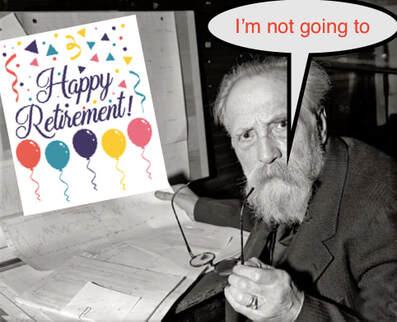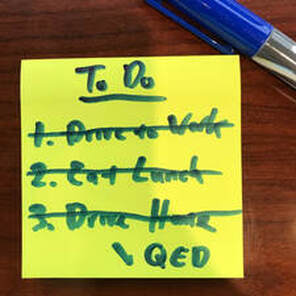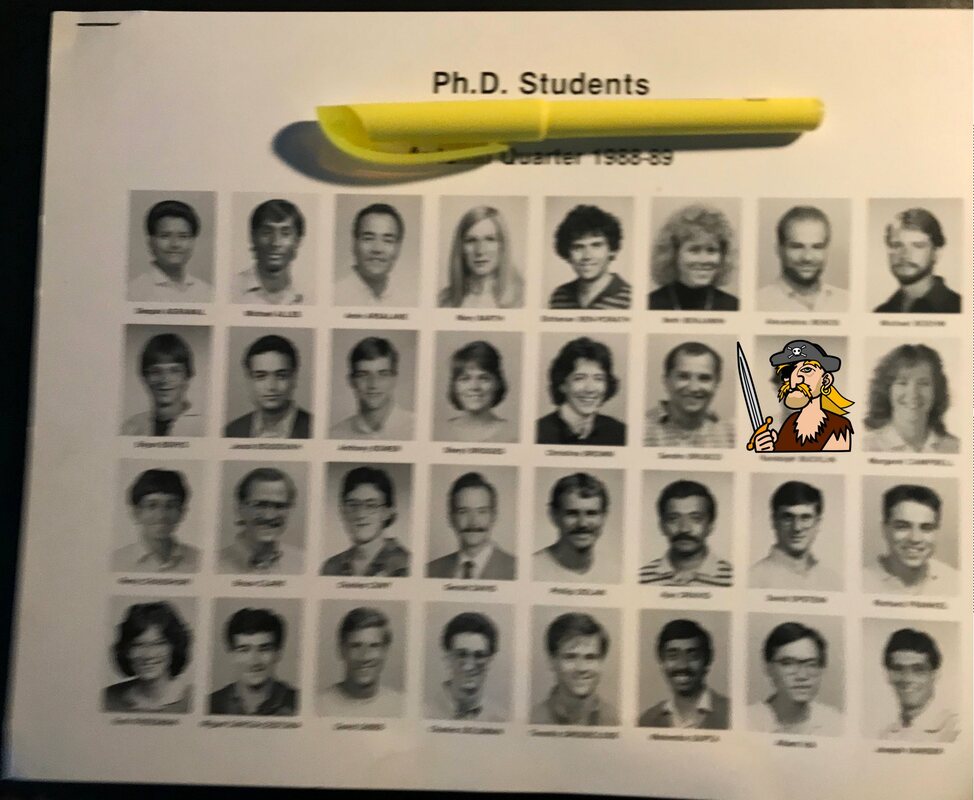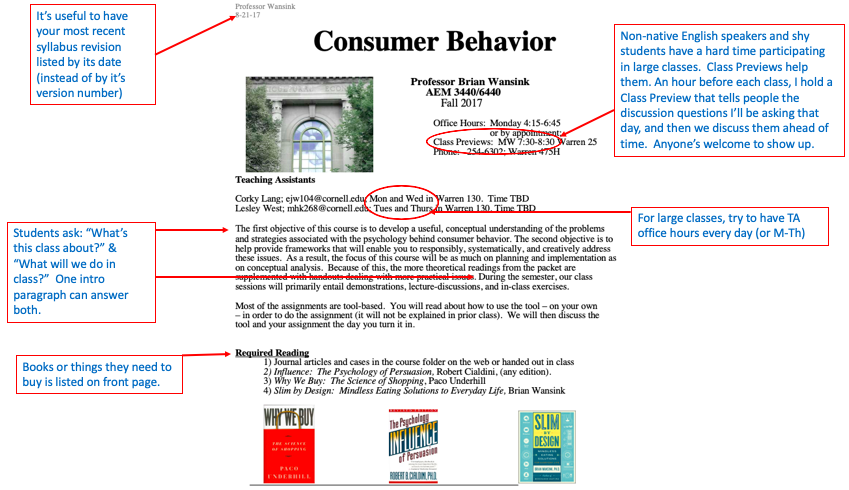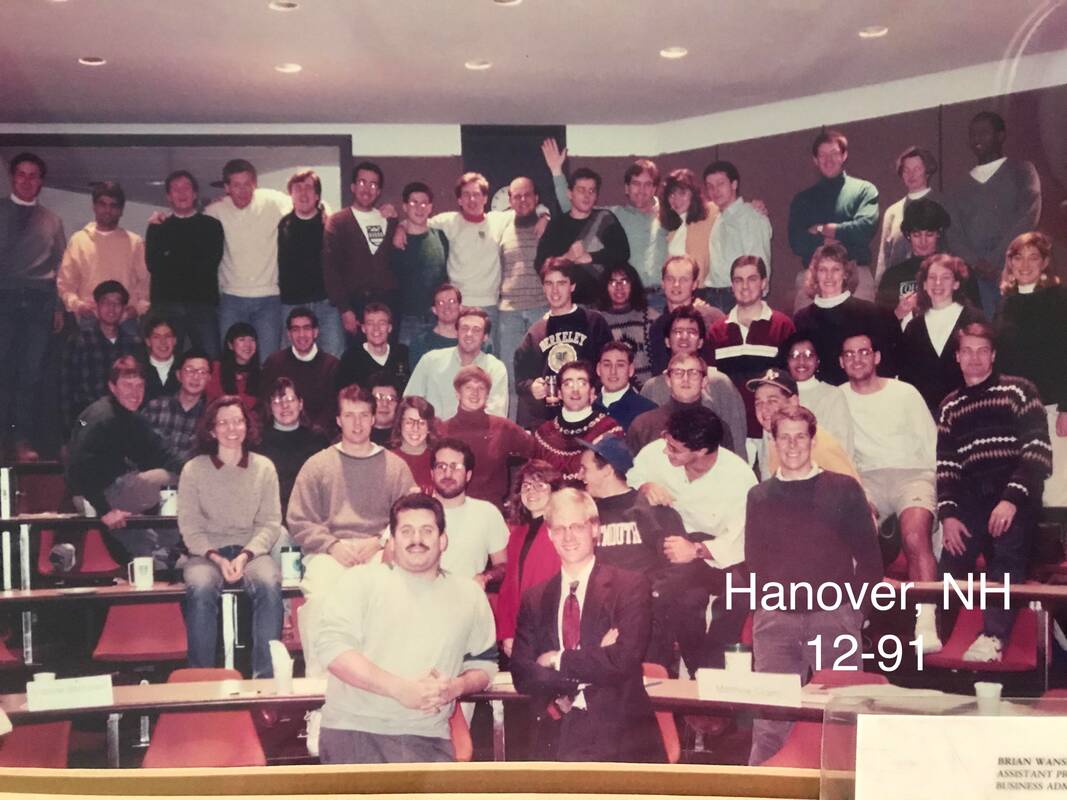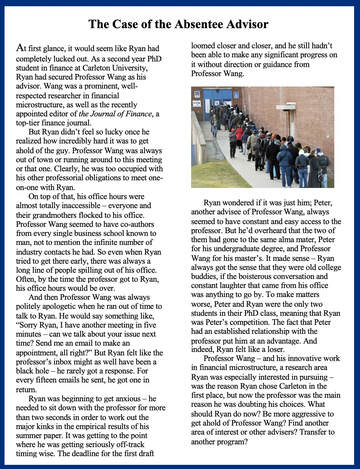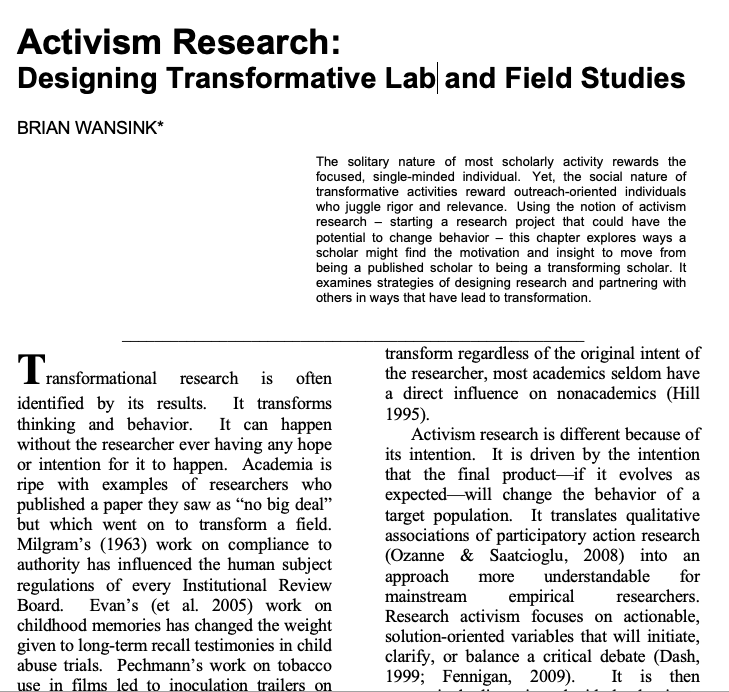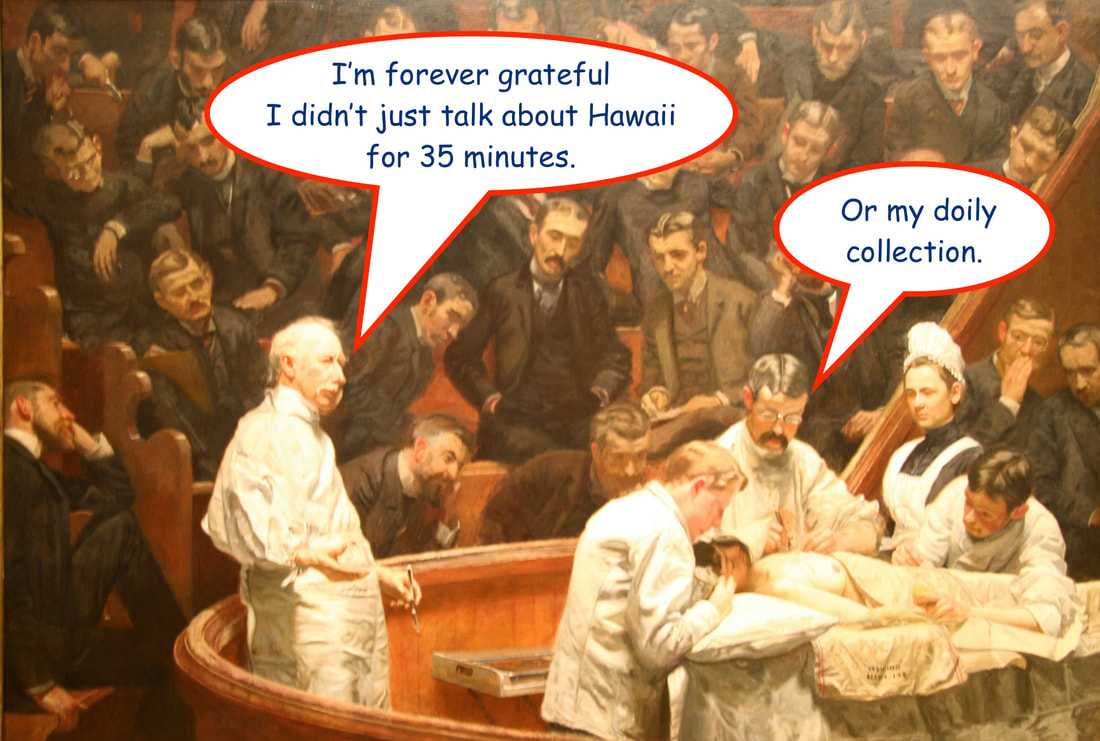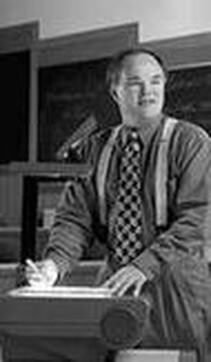|
Today’s the 30th anniversary of the day when the University Registrar weighed five copies of my signed dissertation, stamped it with a red smiley face, and said, “Congratulations, Dr. Wansink.” Within 20 minutes I was shifting my Mercury Lynx into 5th gear on the 3000 mile, unairconditioned, cross-country drive to start teaching the next Tuesday. All I needed was a t-shirt that said “Yesterday I couldn’t even spell ‘Perfessor,’ and today I are one.” I annually celebrate this signature day with good steak, good wine, and having good friends over for a dinner party. I also celebrate it by writing down the best lessons I learned over the past year. Usually, they're the lessons I learned the hard way. Over 30 years, I’ve written down a ton of annual lessons in 30 different notebooks. Some is advice people gave me, and some is based on my own experience – things that are useful to me and might be useful to students and friends. Maybe it will give them a boost or save them some pain. In the spirit of counting to 30 today, here’s a sample of some of these that might be a boost or save a stumble Advice to Graduate Students 1. “The ‘P’ in PhD stands for Perseverance.” – The smartest and most talented people in PhD programs aren’t always the ones who graduate. 2. “It’s an N-period game.” When I had to find a new advisor and defend a new dissertation proposal with four months notice, the game theory economist who gave me this advice was implying that there are a lot of second and third chances in academia as long as you keep swinging. Related to this . . . 3. “Choose your best friend as your advisor.” I heard this from a Med School professor friend who then said “And choose your older brother to be your second committee member, and choose your favorite uncle to be your third.” We tend to choose our dissertation committee based on who’s most famous. Consider which professors most want you to graduate. [Read more] 4. Be a Visiting Professor. Suppose you don’t get a good offer when you graduate from your PhD program (or you get turned down for tenure). If you “settle” for a tenure-track at a school you’re not crazy about, you’ll be perceptually anchored to that type of school by both you and by others. Being a 1- or 2-year visiting professor keeps you from getting anchored, gives you more time to strengthen your vita, and lets you swing again. Career Observations 5. Do solution-focused research. Developing theory is prestigious, but coming up with a solution to an everyday problem is super gratifying. (Again, this is totally my personal preference and advice to myself.) [Read more] 6. Go to a different conference outside your field every year. Even if it’s an on-campus mini-conference in anthropology, you’ll learn a lot and it will keep you humble. 7. Leave town for your sabbatical. Moving is a hassle and there are 100 great reasons why you should spend your sabbatical at home (your spouse’s job, your kids, your doggy, your home, and so on). But I’ve never know anyone who went away for their sabbatical and who didn’t claim it was a career highlight. I’ve also never known anyone who spent their sabbatical at home and remembered anything about it two years later. 8. Writing a book is useful. Almost all academic authors are disappointed their books aren't cited more or sell more. Still, writing a book is worth it because it motivates you to organize, distill, and share what you understand about your topic, and then clarify the gaps you might want to fill in next. 9. A Leave-of-Absence is Transforming. Again, this is about moving away and clearing your head. Leaving town to take a 1- or 2-year paid leave of absence is incredibly revitalizing to every single person I've known. It either gives you amazing confidence that you can also be hugely succeed at something else, or it gives you amazing appreciation for academia. Maybe both. 10. Being fired is a temporary setback. Whether you don’t get tenure or whether something else in your career goes haywire, they say life is 10% what happens to you and 90% how you respond. If things are looking too dark, contact me and I’ll help you, or I'll find you some help. 11. Never retire. One of the great beauties of academia is you can always keep doing the parts of it you love most -- even if you don't go into work. (Here are some ideas on doing it without having later regrets.) Research Experiences 12. 90% of reviewers are great coaches. Reviewers have either made my papers better or they‘ve made me a better researcher. If it wasn’t for reviewers, some of my papers would have never been read by anyone other than me. 13. Create a Best Practices Guide for writing journal articles. – Find 30-40 favorite papers written by other researchers and list out the different strategies, tactics, and words you see them use (perhaps unconsciously) in their abstract, their opening-line, their first paragraph, their introduction, their background, theory section, tables, and so forth. When you’re finished distilling this, you’ll have a Best Practices guide that’s personalized to what you like in a paper and will be your writing guide. When I did this, my acceptance rate almost tripled. Also, papers became a lot easier and more fun for me to write. 14. Use a 2-2-2 strategy to unclog your pipeline. If a manuscript gets desk-rejected, I try to send it to the next journal within 2 days. If it gets conditionally accepted, I revise it and send it back within 2 weeks. If it gets a revise-and-resubmit that doesn’t require any additional studies, I send it back within 2 months. 15. Field studies are worth the hassle. They’re messy, hard to coordinate, inefficient, error-riddled, and harder to publish than lab studies. Still, they are usually memorable and impactful. 16. “Ideas are cheap. Execution is what pays.” Even a mediocre brainstorming session will generate 3-4 publishable ideas, and almost none will be followed up on. Edison said something like “Publishing in the Journal of [insert favorite journal here] is 1% inspiration and 99% perspiration.” Executing is what matters. Productivity Tips 17. “You can either read a lot or you can write a lot, but you can't do both.” 18. "Write the first two hours of every day." The guy who told me this, pretty much said it like a command: no email, no breakfast, no class stuff. Before breakfast and before the kids wake up. It sets a productivity vibe for the whole day. [Read more] 19. Write down the 3 specific things you'll finish each day. Better to have three things completed than 20 things pushed ahead an inch. [Read more] Teaching Insights 20. "Imagine your brother, daughter, or younger self in the front row of your class." This will lead you to give your class sessions more context and more “So what?” It’s also help you cut loose a bit and give the class more punch, fun, and humor. 21. "Teach for where a student will be in 10 years." The guy who told me this is a legend. The idea is to try to get students to visualize their most successful self in 10 years. If we can teach them as the "ten-years-from-now" person they'll be, we’ll be teaching them something they couldn’t just learn from an online class. 22. Education is a buffet; be something unique. Some courses are meaty and some are refreshing; some professors are fiery and others are more chill. You don't need to be like everyone else. By being your best, genuine, earnest self, you’ll be adding variety to their educational buffet. 23. Hold class previews for participation classes. Non-native English speakers and shy students have a hard time participating in class, but class previews can help them. An hour before each class, I hold a class preview and we briefly discuss the day's discussion questions ahead of time. Anyone’s welcome to show up. [Read more] 24. Ask good students who the “must-take” teachers are. See if you can sit in on a couple of their class sessions (most are flattered and only 2 ever turned me down). Take notes about the good teaching ideas you can use. 25. “Don’t become a parody of yourself.” Good teachers slowly start to exaggerate the things they’re good at, and they eventually take it over the top and become a parody of themselves. Dramatic teachers will overfocus on drama. Entertaining teachers will overfocus on entertainment. Cool professors teachers will overfocus on coolness, and so on. [Read more] Fun, People, and Things 26. “Fun people accidently say stupid things. Don’t beat yourself up.” Some academics over-edit everything they say before they speak. If you have a more spontaneous personality, you won't be happy if you have to over edit everything you do. Small accidents will happen (but we get used to it). 27. Dress-up and show-up early for Meetings. This is one way to show respect for the profession and for my colleagues. (Again, this is totally my advice to myself.) Like a US Marine Colonel once told me, "Early is on time. On time is late." 28. Don’t apologize for who I am or hide from it. I’ve had senior colleagues give me well-meaning advice that I should never mention to anyone that I shop at Walmart, play sax in a rock band, go to church, host board game nights, do stand-up comedy, or go thrifting. What you love doing isn’t worth being self-conscious over. If those things are that big of a deal at your school, you’d probably be happier at a different school anyway. [Read more] 29. The more 1-on-1 fun stuff I do with different colleagues outside of work, the more I love my job. The crazier the stuff we do, the more we both seem to love it and remember it. 30. “Max out your TIAA-CREF retirement contribution. Then add more.” The guy who told me this was a retired English professor -- who had two very nice homes. It’s not flashy or cool to save money instead of spending it, but no one over 50 regrets having done so. *** Having an academic mind is a Blurse. It's both a blessing and a curse. It's a blessing because we are almost always looking for better ways to learn or to improve. It's a curse because we're not always very open to what others have found. We feel we have to do it ourselves, or discover it ourselves. If we hear advice from someone else, we might think it doesn't apply or that we're the exception. Ten of the lessons I mentioned are advice someone gave to me. The main reason their advice stuck with me was because I had just finished really screwing up doing it My Way: • #3 only registered when I was told I was being kicked out of the PhD program • #17-18 were only great ideas after I was fired for not publishing enough • #20-21 were brilliant the day I got the second lowest teaching ratings in the school • #26 resonated only after I'd been hissed at in class after making an unfunny comment Hopefully these might give you a boost, save you a stumble, or lead to your own self-discovered list. Being a scholar and an academic is an unbelievably great calling. Good luck having many, many great years -- each more amazing than the one before. Let me know how I can help. Comments are closed.
|
Welcome...Fun, useful, or wacky experiences about getting tenure, teaching better, publishing more, and having an incredibly rewarding career.
Categories
All
Some Blog ShortcutsArchives
September 2020
|

 RSS Feed
RSS Feed


